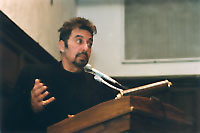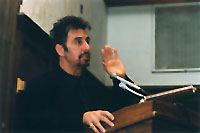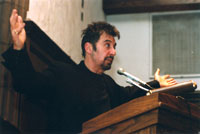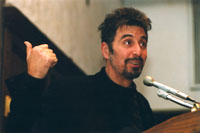
|
their characters, says Pacino
Striding down the center aisle of the University Theatre, Academy Award-winning actor Al Pacino flung his arms open wide and proclaimed with a grin, "I don't know what I'm walking into here!"
The declaration drew both laughter and applause from the assembled undergraduates, who certainly knew why they were there -- to garner insights about acting, specifically acting in Shakespearean plays, from one of today's most acclaimed thespians.
Pacino came to campus as a guest of the Yale University Dramatic Association, the Yale Film Society and the Yale Shakespeare Company.
His Nov. 19 visit included a master class on acting in the School of Drama's University Theatre; screenings at the Whitney Humanities Center of Pacino's latest film, "The Insider," and of "Looking for Richard," a documentary about the creation of a production of Shakespeare's "Richard III," which Pacino starred in, directed and produced; a question-and-answer session with the celebrity after the screenings (see related story, below); and a dinner in Pacino's honor, where he was given an award in recognition of his achievements in acting by Yale College Dean Richard Brodhead.
The hundred or so undergraduates who had gathered at the drama school to hear Pacino's advice on acting included members of the Yale Dramat and theater studies majors. The session began with two scenes from "Othello" -- the murder of Desdemona and an argument between the Moor and Iago -- performed by undergraduate actors.
At the conclusion of these scenes, Pacino pulled a chair onto the stage and questioned the performers about how they'd chosen the scenes they'd staged (the selections had been assigned), how long they'd rehearsed their roles (about four days) and who had directed the performances (only themselves). He encouraged the students to continue working on the scenes -- perhaps even to videotape their performances -- until they'd developed a deep understanding of their character's motivations. Pacino then proceeded to offer suggestions to the group in general about how to enhance their performance skills.
The most important thing for an actor, explained Pacino, is to find a way to develop a bond with his or her character. "The role that connects -- it's the greatest thing that can happen to every actor," he said.
In years gone by, Pacino noted, actors would often find one role that they were particularly good in, and perform that role exclusively. "In our world today, it's not the same thing. Today it's all about diversity," he said.
Pacino noted that, during his days doing repertory theater, he would sometimes audition for a specific role that both he and others thought would be perfect for him, only to end up with another part. Yet, he said, grappling with those less-coveted roles helped him grow as an actor, and he encouraged the students to attempt characters that might, at first, seem incomprehensible to them. "We don't know what's right for us until we try it," he said.
Turning to the challenges of performing in Shakespeare's plays, Pacino contended that the Bard's works are perfect for actors because they were written by someone who was a performer himself. "Only an actor can understand actors. ... So, who can understand Shakespeare better than actors?" he said, advising that performers "stay closest to what Shakespeare wrote" in interpreting their roles.
Pacino conceded that the antiquated language in Shakespeare's plays can impede actors' abilities to understand their characters, and suggested that the young thespians begin by reading the play over and over until they comprehend the meaning behind the language. He also encouraged them to sing their lines, as if they were performing in an opera. "The notes can bring us to a certain place. ... Then all of a sudden, it starts to happen," he said.
The actor -- who has won Tony, Obie and Theatre World awards for his roles in Broadway and off-Broadway productions -- also told the students, "Sometimes it's a good idea to improvise. I know that sounds crazy when you're talking about Shakespeare. But once you improvise being in a certain situation, when you go back into character, you have a better idea of what your motivations are in the scene."
Asking questions about the character can also offer insights into their motivations, said the celebrity. "Has Othello ever been in love before? ... Why is Iago so [expletive] mad?"
Pacino noted, "You have to find a way to make this role and this situation connect to you, so you can be engaged with it. ... If you can make that connection, it will take away the tendency to fall into the 'language thing,' or to be stifled by it or inhibited by it. ... An adventure is going to start when you know who you are in relation to the character.
The star, who won an Oscar for his role in "Scent of a Woman," pointed out to the students that, "We're required as actors to be in a certain state in order to render, mirror, what's going on in this play." By taking the time to learn every aspect of the character, actors become "really privy to so much stuff ... that makes us have so much more information than anyone in the audience will have, but we have to swallow it, so they can understand."
-- By LuAnn Bishop
The following edited and excerpted observations were made by Academy Award-winning actor Al Pacino during his question-and-answer session with students following the screenings of his latest feature film "The Insider" and the documentary "Looking for Richard," which he starred in, directed and produced.
"When I was younger, my mother took me to the movies, and I'd act out the parts the next day. It started there. ...
"I never wanted to be an actor. Then in school, I found out it was a good way of getting out of class. Because I got into the plays I didn't have to do all that other stuff, and I said, 'All right, I'll be an actor.' I knew it was an impossible dream, but I had encouragement when I was in eighth grade. My eighth-grade acting teacher came to my home and said she thought that my grandmother should encourage me. This actually left my memory until later on in life, and I thought, 'Gee, it was this teacher, this eighth-grade teacher, who changed my life.'"
"Shakespeare was alien to me growing up. It was something that I wasn't familiar with. It was always communicated to me that you had to be a certain type, you had to have a certain education, to be a certain way, in order to do Shakespeare -- that some kid from the South Bronx, which I was, was unable to do Shakespeare. It had nothing to do with my life, with what I know.
"But later on, I got into classes and I started responding to this material. Then I started learning Shakespeare in a way, the only way really that an actor can -- that is, to engage in a role and by doing that, to learn the play in that personal, intimate way. I don't think that most of you who are not actors have that opportunity to really learn the play in that way. I think once you do, things unfold: You hear things and you see things in the play that you never would on first hearing.
"If I were to teach a course in Shakespeare to non-actors, I'd have them act because I think they would get inside the play in that way. "
"Making 'Looking for Richard' made me relate to film in a way that I never had done before. I do recommend making a film if you want to learn. ... I don't see myself as a director. A director sees material as something he wants to direct; I see the material as something I want to act."
"Although I never had a formal training in certain method exercises, I would be close to being a method actor, if that means anything. Not that it really is a method. Everyone has one, and ours really is simply, I guess, living. ... If I'm playing a cook, I have to do a quick study of a cook. It's like finding someone who speaks a certain language. There's just so much you can absorb with the language. You have to find these key things that set you up. When I'm playing a cook, I go and hang out in the kitchen. What I hope will happen is that I'll absorb unconsciously some of these things. ... What stays with me is what I use. I admire very much the way he flips an egg, but that doesn't stay with me later. Another thing stays with me -- the way he wipes a counter ...
"There's this story about Michael Chekhov, the great acting teacher, who was portraying a character going to the guillotines in a play and he was just terrified. Everyone was asking him, 'What are you thinking about, the guillotine? Having your head chopped off?' No, he was thinking about a cold shower. It worked for him. That's method. It's not always that you're just imagining yourself at the guillotine. That's not going to do it. Sometimes it's a little more personal than that, you think about that shower because in the end that's what you're thinking about anyway. You're relating to something. If you're terrified, you're relating to something real, even if you're not conscious of it."
"It's hard for me to pick one out. They're racing through my mind as I talk. I think 'Scarface' comes out. [Applause and cheers from the audience.] I'm very happy about that movie, because when it first came out it was a scandal. ... At the time I knew it wasn't getting what I thought it deserved. It seemed to be speaking about something."
"The first 'Godfather.' It was the most challenging because I didn't know how I could sustain this kind of guy and then turn into that later part. ... I remember spending many, many weeks -- months -- just thinking about how I would make this kid into what he becomes."
-- By Dorie Baker
T H I S
Bulletin Home
Comments from an Academy Award-winning actor on ...
... How he was drawn to acting.
... Acting in Shakespearean plays.
... Directing a film.
... "Method" acting.
... His favorite role.
... His most challenging role.
 W E E K ' S
W E E K ' S S T O R I E S
S T O R I E S![]()
 Divinity School gets $6 million grant
Divinity School gets $6 million grant![]()
![]()
 CMI will boost faculty's use of new media
CMI will boost faculty's use of new media![]()
![]()
 'Accelerated life' suits Yale's youngest star
'Accelerated life' suits Yale's youngest star![]()
![]()
 From the University Provost
From the University Provost![]()
![]()
 Endowed Professorships
Endowed Professorships![]()
![]()
 Gifts support use of new technologies in teaching and learning
Gifts support use of new technologies in teaching and learning![]()
![]()
 Yale SOM experts take to the airwaves
Yale SOM experts take to the airwaves![]()
![]()
 Actors must connect with their characters, says Pacino
Actors must connect with their characters, says Pacino![]()
![]()
 Interior Secretary to discuss environmental ethics
Interior Secretary to discuss environmental ethics![]()
![]()
 Ralph Reed to give lecture at Law School
Ralph Reed to give lecture at Law School![]()
![]()
 Scientists' characterization of yeast gene may yield clues about how human cells work
Scientists' characterization of yeast gene may yield clues about how human cells work![]()
![]()
 Keith Wilson earns high honors for his musical contributions
Keith Wilson earns high honors for his musical contributions![]()
![]()
 Drama takes audience on metaphysical train ride
Drama takes audience on metaphysical train ride![]()
![]()
 Doctor helps design Disney exhibit on high-tech world of radiology
Doctor helps design Disney exhibit on high-tech world of radiology![]()
![]()
 Yale-related renovation projects win design awards
Yale-related renovation projects win design awards![]()
![]()
 Researcher wins competitive McKnight Investigator Award
Researcher wins competitive McKnight Investigator Award![]()
![]()
 Duke's Men to perform in the 'Do Downtown' lunchtime series
Duke's Men to perform in the 'Do Downtown' lunchtime series![]()
![]()
 Holiday Toys for Kids drive
Holiday Toys for Kids drive![]()
![]()
 Modest measures advised in preparation for Y2K
Modest measures advised in preparation for Y2K![]()
![]()
 Hawkshaw speaks at conference on Bruckner
Hawkshaw speaks at conference on Bruckner![]()
![]()
 . . In the News . . .
. . In the News . . .![]()
 |
| Visiting on Campus
Visiting on Campus |
| Calendar of Events
Calendar of Events |
| Bulletin Board
Bulletin Board![]()
Classified Ads |
| Search Archives
Search Archives |
| Production Schedule
Production Schedule |
| Bulletin Staff
Bulletin Staff![]()
Public Affairs Home |
| News Releases
News Releases |
| E-Mail Us
E-Mail Us |
| Yale Home Page
Yale Home Page


